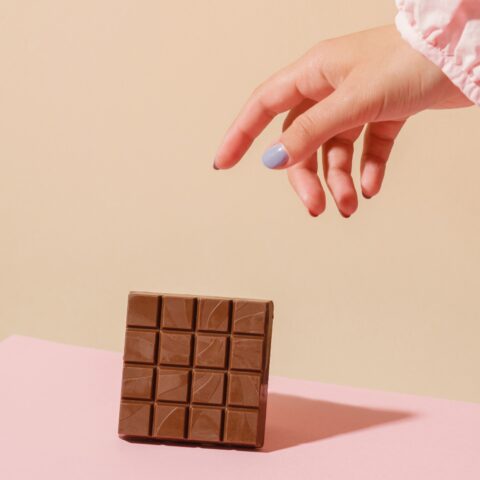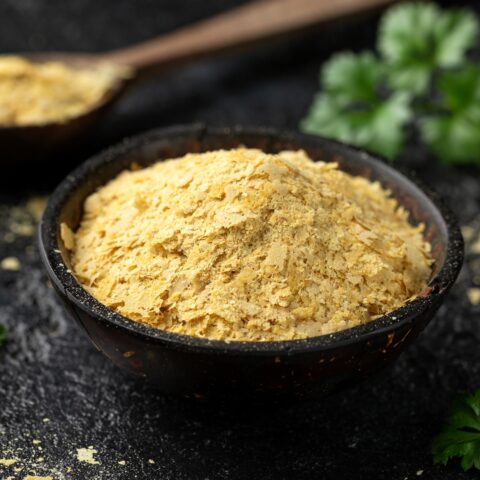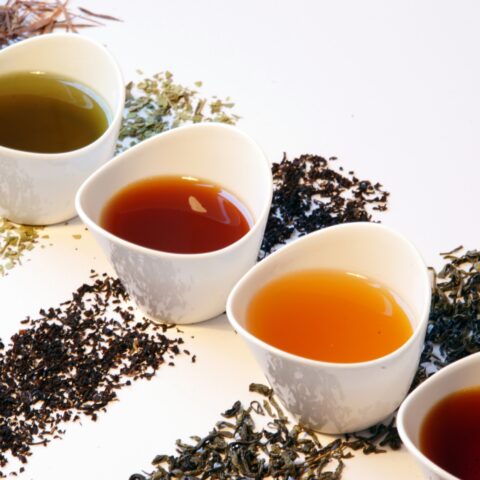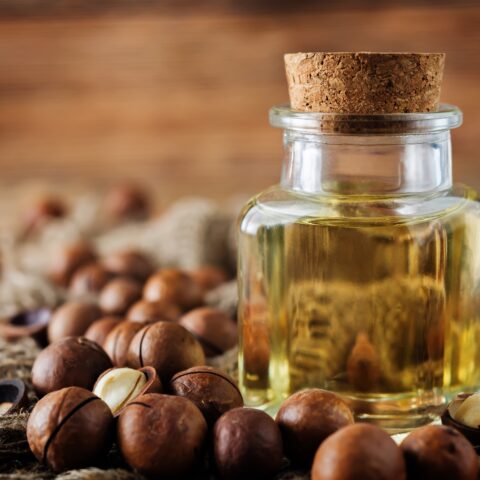Is Vinegar Paleo?
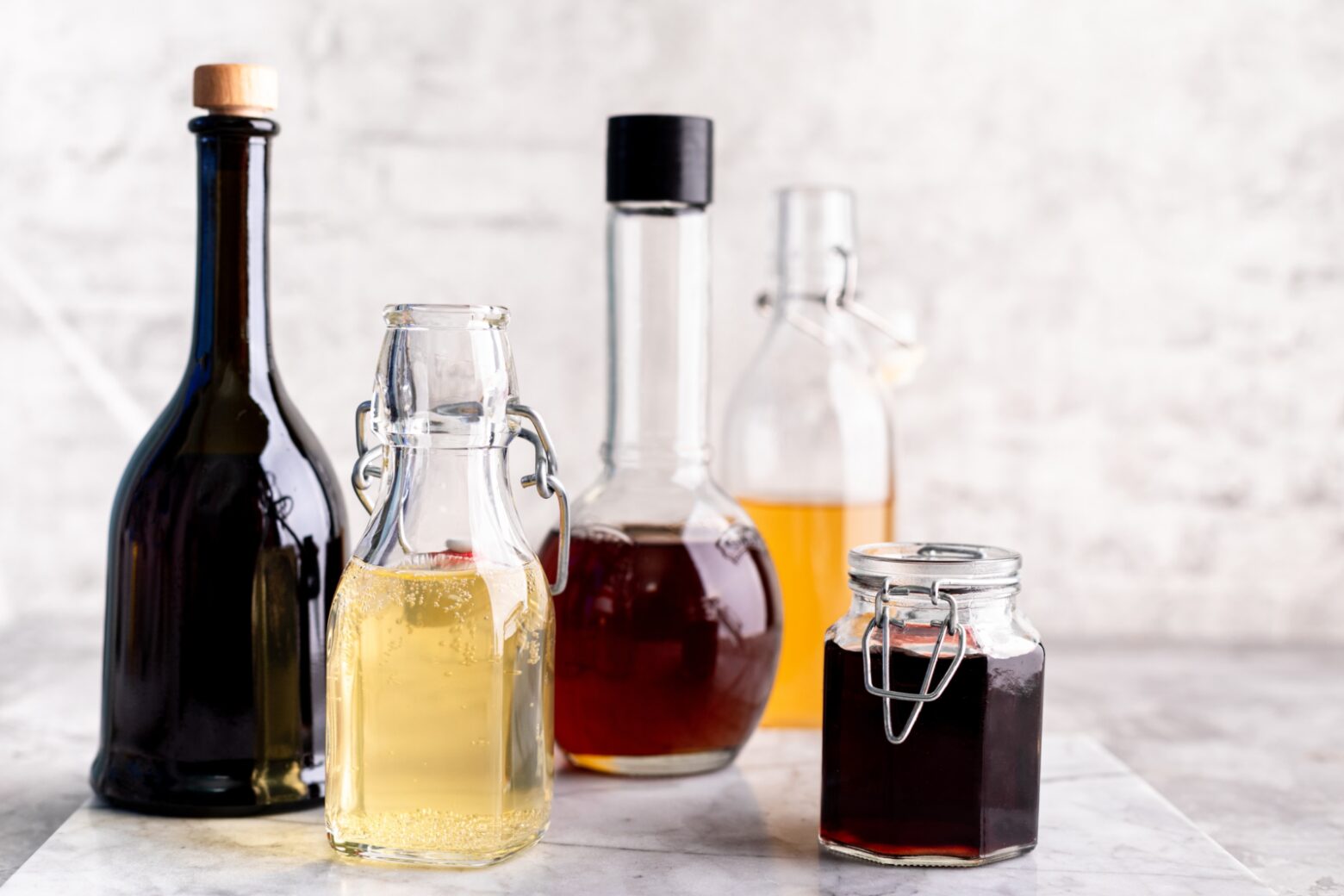
As far as controversial foods are concerned, vinegar is not atop any list—unless, of course, the debate is whether it’s Paleo or not.
There are reasonable claims on either side of the argument. They range from the perspective that vinegar is naturally occurring and, therefore, acceptable to the perspective that it is a man-made, processed product in the form we consume it today and, therefore, unacceptable.
So, is vinegar Paleo? The short answer is yes, if it’s made from Paleo-friendly ingredients (like apples). So, while apple cider vinegar is okay in moderation, rice wine vinegar and other vinegars from non-Paleo ingredients are the exception.
Let’s jump in and clear up the confusion around vinegar.
What is vinegar?
Vinegar is made with a mixture of water and acetic acid, which is produced through a fermentation process of ethanol (alcohol) or sugars. During this process, acetic acid bacteria eat and process these sugars, which produces the acetic acid-infused liquid we know as vinegar.
Depending on the type of vinegar and what was used in the fermentation process, this liquid can also be rich in enzymes, proteins, and probiotics that are claimed to help with gut health, among other benefits.
What are the benefits of vinegar?
Research suggests vinegar may help with weight loss and improve skin health. [1, 2] Researchers believe most of these benefits are due to the acetic acid content in vinegar.
Apple cider vinegar, which is produced from the fermentation of sugar from apples, is one type that has been heavily studied in recent years and is usually a popular target for the “Is it Paleo?” question.
Research shows that apple cider vinegar is highly anti-bacterial. In an ode to historical accounts that claim Hippocrates used vinegar roughly 2,000 years ago to clean wounds, modern studies now show that vinegar can help kill pathogens and can also be used as a food preservative due to its ability to inhibit dangerous bacteria like E.Coli. [3, 4]
While anecdotal, many also claim that diluted apple cider vinegar can help improve acne when used as a toner (the keyword there is diluted).
Apple cider vinegar might also improve the insulin response and lower blood sugar. In fact, one study found that vinegar may improve insulin sensitivity by 19–34 percent during a high-carb meal. [5]
Is vinegar Paleo-approved?
In short, vinegar (as we produce it today) would not have been a huge part of our Paleolithic ancestors’ diets. Even so, the process of fermentation is one that occurs naturally.
Vinegar is similar to honey in that it is a natural substance that would have been eaten if our ancestors found it… but finding it would not have been a frequent occurrence. Our ancestors wouldn’t have been bottling vinegar or using it on their Paleo salads twice a day, for instance. It would have been extremely rare to even find it by accident in nature.
Remember, there are many things we eat in our modern diets that technically aren’t purely “Paleo”. Organic apples are larger and contain more sugar than their wild, ancestral counterparts. Almond butter technically requires processing that wouldn’t have been feasible in Paleolithic times. However, these items do have a place in a modern Paleo Diet.
Similarly, vinegar is a good option for flavoring in moderation. It has certain health benefits and no adverse side effects that we’re aware of, so long as it doesn’t contain added preservatives or sugars.
The best vinegar types
Remember that vinegars made from non-Paleo or non-natural ingredients, such as rice, aren’t recommended on the Paleo Diet. This isn’t because they are inherently terrible, but simply due to the fact that there hasn’t been much research done on whether anti-nutrients found in grains like rice carry over into rice vinegar. Plus, with so many other vinegar options available, there isn’t a need to choose vinegars made from grain.
The best types of vinegars are those made from whole food sources, such as:
- Apple cider vinegar (with the “mother,” the strands of probiotic enzymes that form during fermentation)
- Balsamic vinegar
- Red and white wine vinegar
- Coconut vinegar
As always, organic is best, and double-check that the vinegar you buy contains no additives, preservatives, or added sugars.
The bottom line
While the originator of The Paleo Diet®, Dr. Loren Cordain, didn’t always approve of vinegar as part of the Paleo Diet, he has since changed his stance. If vinegar is made from Paleo-friendly ingredients and does not contain additives or added sugars, it can be a beneficial part of a healthy Paleo Diet.
References
- Tomo Kondoo, et al. Vinegar Intake Reduces Body Weight, Body Fat Mass, and Serum Triglyceride Levels in Obese Japanese Subjects. Bioscience, Biotechnology, and Biochemistry. 22 May 2014. <https://www.tandfonline.com/doi/pdf/10.1271/bbb.90231>
- Not Ri Lee, et al. Application of Topical Acids Improves Atopic Dermatitis in Murine Model by Enhancement of Skin Barrier Functions Regardless of the Origin of Acids. Ann Dermatol. 2016 Dec. <https://www.ncbi.nlm.nih.gov/pmc/articles/PMC5125949/>
- Darshna Yagnik, Vlad Serafin, and Ajit J. Shah. Antimicrobial activity of apple cider vinegar against Escherichia coli, Staphylococcus aureus and Candida albicans; downregulating cytokine and microbial protein expression. Sci Rep. 2018. DOI: 10.1038/s41598-017-18618-x. <https://www.ncbi.nlm.nih.gov/pmc/articles/PMC5788933/>
- E. Entani, et al. Antibacterial action of vinegar against food-borne pathogenic bacteria including Escherichia coli O157:H7. J Food Prot. 1998 Aug. DOI:10.4315/0362-028x-61.8.953. <https://pubmed.ncbi.nlm.nih.gov/9713753/>
- Carol S. Johnston, et al. Vinegar Improves Insulin Sensitivity to a High-Carbohydrate Meal in Subjects With Insulin Resistance or Type 2 Diabetes. Diabetes Care 2004 Jan; 27(1): 281-282. <https://care.diabetesjournals.org/content/27/1/281.long>
Megan Patiry
Megan Patiry is a freelance writer specializing in ancestral nutrition. She has personally followed a Paleo-style, ancestral style of eating for over a decade.
More About The Author
